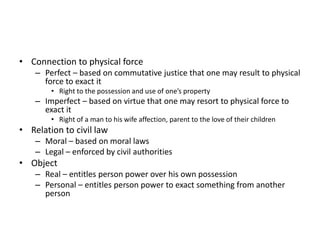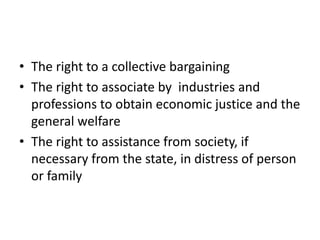Rights and Duties
- 1. Rights and Duties Code of Ethics
- 2. Rights • legal, social, or ethical principles of freedom or entitlement • what is allowed of people or owed to people, according to some legal system, social convention, or ethical theory • Effect or consequence of the law
- 3. Duties • moral commitment to someone or something • root idea of obligation to serve or give something in return • committed to the cause involve even if it requires sacrifice • restriction of free will through the prescription of the law • ought but not a must
- 4. Rights and Duties • Correlative with each other – If someone has a right, someone else have to the duty to bestow it • Rights and Duties are balanced there can be a harmonious life
- 5. Division of Rights • Law – Natural - own of virtue in the conditions of nature • Right to life, health, body, metal integrity – Positive - conferred on person by ordinance of legitimate authority • Rights of labor and industry, right of inheritance and contracts • Origin – Connatural - right of man because of his nature as a person • Right to marry, right of parents over children – Acquired - right obtained through a mans specific actions of his behalf • Right to property, right to house or car
- 6. • Subject – Public - right of private person against the state which end in common good • Right not to be condemned without due process of the law, right of unfair confiscation – Private - right of private person against private person which end in individual good • Right between employer and employee • Connection with the subject – Inalienable - cannot be transferred because it is necessary for the fulfilment of mans purpose of being and essential duties • Right to life , liberty of conscience – Alienable - can be transferred because its not essential in human nature • Right to marry, free speech
- 7. • Connection to physical force – Perfect – based on commutative justice that one may result to physical force to exact it • Right to the possession and use of one’s property – Imperfect – based on virtue that one may resort to physical force to exact it • Right of a man to his wife affection, parent to the love of their children • Relation to civil law – Moral – based on moral laws – Legal – enforced by civil authorities • Object – Real – entitles person power over his own possession – Personal – entitles person power to exact something from another person
- 8. Human Rights • Individual • Others to Family • Others to its Domestic Affairs • Others as a member of International Community
- 9. The Rights of the Human Person • The right to life and bodily integrity from the moment of conception, regardless of physical or mental condition, except in just punishment of crime • The right to serve and worship God in private and in public • The right to religious formation through education and association • The right to personal liberty under just law • The right to the equal protection of just law regardless of sex, nationality, color or creed
- 10. • The right of freedom of expression of information and of communication in accordance with truth and justice • The right to choose and freely maintain a state of life, married or single, lay or religious • The right to education suitable for the maintenance and development of mans dignity as a human person • The right to petition the government for redress or grievances • The right to a nationality
- 11. • The right of access to the means of livelihood, by migration when necessary • The right of association and peaceable assembly • The right to work and choose one’s occupation • The right to personal ownership, use and disposal of property, subject to the rights of others and to limitations on the interest of the general welfare • The right to a living wage
- 12. • The right to a collective bargaining • The right to associate by industries and professions to obtain economic justice and the general welfare • The right to assistance from society, if necessary from the state, in distress of person or family
- 13. The Rights Pertaining to the Family • The right to marry, establish a home and beget children • The right to economic security sufficient for the stability and independence of the family • The right to the protection of maternity • The right to educate children • The right to maintain, if necessary by public protection and assistance, adequate standards of child welfare within the family circle.
- 14. • The right to assistance, through community services in the education and care of the children • The right to housing adapted to the needs and functions of family life • The right to immunity of a home to search and trespass • The right to protection against immoral conditions in the community
- 15. The Domestic Rights of State • The right to enact just laws binding in conscience • The right to establish courts of justice and to enforce the observance of law with adequate sanctions • The right to demand of its citizens respect for the right of minorities • The right to tax by adequate and equitable means in order to carry out its proper functions • The right to exercise eminent domain when demanded by the common welfare
- 16. • The right to require that its people receive and education suitable for citizenship • The right to defend itself against domestic violence • The right to watch over, stimulate, restrain, and order the private activities of individuals and groups in the degree that is necessary for the common good • The right to regulate operations of international economic groups functioning within its own boundaries • The right to adopt in time of emergency special measures necessary for the common good
- 17. The Rights of States in the International Community • The right to exist as a member of international community and to be protected in its national life and integrity against acts of aggression by any other state or states • The right to independence in the determination of its own domestic and foreign policies in accordance with the principles of morality and subject to the obligations of international law • The right to juridical equality with other states in the family of nations • The right to membership in the organized international community and to the benefits of international cooperation • The right to the assistance of international community in securing the fulfilment in the terms of a just treaty
- 18. • The right to obtain from the international community redress of grievances arising from unjust treaties imposed by force • The right to the revision of treaties which are no longer in accord with fundamental justice • The right to recourse to the procedures of pacific settlement established by the international community for disputes which diplomatic negotiations have failed to settle • The right to maintain political, economic and social intercourse with other states upon equal terms • The right to access, upon equal terms, to the markets and raw materials of the world necessary for its own life as a people
- 19. • The right to protect its own natural resources and economic life from unjust exploitation • The right to the assistance of the international community in time of economic or social distress • The right to grant asylum to refugees from injustice


















